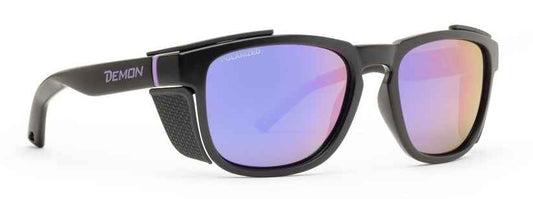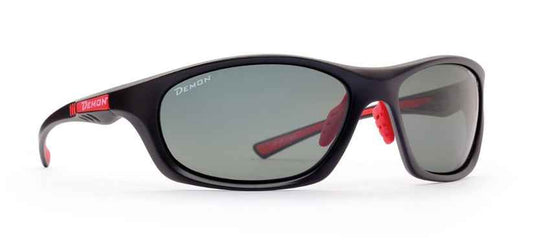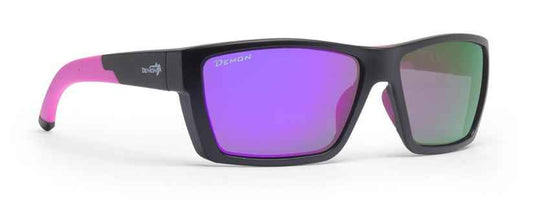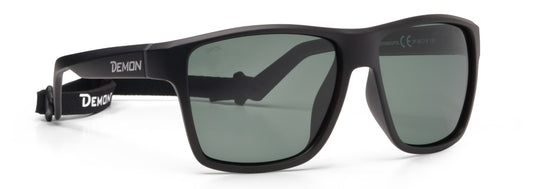Collection: Sunglasses for Playing Golf
Sunglasses for Playing Golf
Improve Your Score
Golf is a sport that demands precision, focus, and keen visual perception, and several environmental factors can pose challenges for players. Strong sunlight, rapidly changing light conditions, and the interplay of shadows on the course can make it difficult to accurately judge distances, read the green, or track the ball. Additionally, uneven terrain and subtle undulations on fairways and greens require constant attention, while prolonged exposure to bright sunlight can lead to eye fatigue and strain, further impacting performance.
Sports sunglasses are an effective solution to these challenges. High-quality lenses reduce glare, enhance contrast, and maintain natural color perception, allowing golfers to clearly see the ball, the contours of the green, and potential obstacles. For players who require vision correction, technical sunglasses with prescription lenses provide the same optical benefits while ensuring perfect vision throughout the game.
By wearing the right pair of golf sunglasses, athletes can protect their eyes, reduce fatigue, and maintain focus, enabling them to make more accurate shots and consistently improve their performance. In essence, the right eyewear is not just a protective accessory it is a performance-enhancing tool that helps golfers achieve their best score, round after round.
What Type of Glasses and Lenses Should a Golfer Use?
Selecting the right glasses for golf is about more than style it is a key factor in optimizing performance, focus, and comfort throughout the game. The choice of frame and lenses can significantly influence how well you perceive the course, read the green, and track the ball.
Lightweight Frame:
One of the most important considerations is frame weight. Lighter frames reduce pressure on the nose and ears, allowing golfers to wear their glasses comfortably for several hours without fatigue or distraction. While materials vary from aluminum to titanium the consensus among athletes is that lightness and comfort are paramount.
At DEMON, we use TR90, a high-performance blend of carbon fiber and nylon, to create frames that are approximately 20% lighter than conventional materials. This material offers multiple advantages: it is resistant to high and low temperatures, maintains its shape under stress, withstands impacts and mechanical stress, and provides exceptional comfort. The result is a pair of glasses that remain secure, durable, and comfortable throughout the entire round.
Frame Style:
Beyond material, the style and design of the frame are largely a matter of personal preference. Some golfers prefer closed-frame designs, which offer a sleeker look and full coverage around the eyes, while others opt for open-frame models, which provide a more minimalist feel and greater ventilation. Regardless of style, the frame should fit securely, allowing you to focus entirely on your game without distraction.
Choosing the right glasses with a combination of lightweight, durable frames and a style suited to your comfort can enhance your visual performance, improve concentration on the course, and help you maintain precision and confidence throughout every swing.

Why Standard Sunglasses Are Not Enough for Golf
A common challenge on the golf course is intense sunlight, which can make tracking the ball’s trajectory difficult and negatively affect performance. While many people rely on standard sunglasses, these often fall short for golfers due to several key factors:
Lens Performance: Traditional lenses are not designed for the specific demands of golf. They may darken the view excessively, reducing contrast and making it harder to read the green, judge distances, and spot subtle contours on the course. Proper sports lenses enhance visual clarity and depth perception, allowing golfers to make more accurate shots.
Frame Design: Standard sunglasses usually have slightly curved frames, which allow light to enter from the sides. This lateral light creates glare and distractions, making it difficult for golfers to maintain consistent focus during swings or while lining up a shot.
Lack of Non-Slip Features: Many conventional frames lack technical rubber grips, which can cause glasses to slip during the rotational movement of a golf swing. Even slight displacement can interfere with vision and concentration, reducing overall performance.
Weight: Non-technical glasses are often heavier, leading to discomfort during extended rounds and additional fatigue, particularly during long tournaments or practice sessions.
What Are the Main Differences in Lenses for Playing Golf?
For golfers, tracking the ball and its trajectory accurately is essential for making precise shots, while maintaining a clear, distortion-free view of the entire course is critical for reading the green, evaluating slopes, and judging distances. Lenses that distort depth perception can lead to misjudged shots, causing balls to land too long or too short and negatively impacting overall performance. Choosing the right lens is therefore key for both visual clarity and comfort throughout a round.
Here are the main types of lenses suitable for golfing:
Photochromic Lenses:
Photochromic lenses are highly versatile and respond dynamically to changes in light. When exposed to UV radiation or sunlight, they undergo a reversible chemical reaction, darkening in bright conditions and returning to transparency in lower light. This adaptability allows golfers to maintain clear vision across varying lighting conditions without the need to change glasses or remove them when moving between sunlit areas and shaded parts of the course.
Smoke Lenses:
Photochromic Smoke lenses start completely transparent (Category 1) and darken up to Category 2.5 at maximum activation. Even when fully activated, they remain slightly lighter than traditional dark lenses, making them ideal for golfers who frequently move between sun and shade. These lenses allow for quick adaptation to changing light conditions, avoiding the need to remove the glasses when entering shaded areas. In dense forests or wooded sections, the lenses become fully transparent, continuing to protect against wind, air, and debris such as leaves or small branches. Their transparency also makes them suitable for low-light or nighttime use, providing basic protection while remaining functional in near-dark conditions.
DCHROM Lenses:
DCHROM lenses are designed for extremely bright and prolonged sunlight exposure, making them ideal for long rounds on open courses. They begin with a slightly tinted base (Category 1) and darken to Category 3, similar to traditional sunglasses, offering maximum protection from glare and brightness. These lenses provide stable performance without significant light-dark variations, so golfers do not need to remove them frequently. However, they are not recommended for nighttime use, as the darker tint can hinder visibility in low-light conditions.
| Feature | Photochromic Smoke | Photochromic DCHROM |
|---|---|---|
| Starting Tint | Transparent (Cat 1) | Slightly tinted (Cat 1) |
| Maximum Darkness | Cat 2.5 | Cat 3 |
| Ideal Use | Mixed light conditions, shaded areas, low-light or night | Extremely bright, prolonged sunlight |
| Adaptability | Quick adjustment to light changes | Stable in strong light, less suited for low-light |
| Protection | Wind, debris, moderate glare | Maximum glare protection, intense sunlight |
By understanding the differences in lens technology, golfers can choose the optimal lenses for their course conditions, ensuring maximum visual clarity, comfort, and performance during every round.

Interchangeable DCHANGE Lenses for Golf
The DCHANGE lens system offers golfers maximum versatility by providing a set of three interchangeable lenses, allowing you to adapt your glasses to any weather or lighting condition. Whether you’re playing under intense sunlight, cloudy skies, rain, or even during nighttime or low-light matches, these lenses ensure optimal visual clarity, protection, and comfort throughout your round.
The interchangeable lens set includes:
Smoke Lens (Category 3):
Designed for bright, sunny conditions, the Smoke lens offers excellent UV protection while reducing glare and enhancing contrast on sunlit greens. Its Category 3 rating ensures that your eyes remain comfortable even during prolonged exposure to intense sunlight, allowing you to clearly track the ball and read the terrain without eye fatigue.
Orange Lens (Category 2):
The Orange lens is ideal for cloudy or overcast days, providing enhanced contrast and depth perception in moderate lighting conditions. Also equipped with UV protection, this lens helps golfers discern subtle undulations on the course and maintain visual precision when natural light is diffused or inconsistent.
Transparent Lens (Category 1):
The Transparent lens is perfect for rain, very low-light, or nighttime conditions, offering UV protection and clear, unobstructed vision. It shields your eyes from wind and debris while ensuring maximum visibility when light levels are low, making it suitable for early morning or evening rounds and challenging weather conditions.
By switching between these three lenses, golfers can customize their eyewear to match any environmental condition, ensuring consistent performance, safety, and comfort throughout the game.
Example Lens Set: Smoke mirrored, Orange, and Transparent—each designed to meet specific lighting conditions while providing the same high level of protection and optical clarity that DEMON sports glasses are known for.

DPOL Polarized Lens for Golf
The DPOL polarized lens is a high-performance option designed to provide golfers with superior visual clarity, protection, and comfort during play. At its core, the lens offers full UV protection, shielding your eyes from both UV-A and UV-B rays, which are harmful during prolonged exposure to sunlight on open courses.
Beyond basic UV defense, the DPOL lens features polarization technology that can concentrate or diffuse incoming light rays, effectively eliminating horizontal reflections from reflective surfaces such as wet greens, sand traps, water hazards, or shiny equipment. This reduction in glare significantly decreases eye strain, helping golfers maintain focus and comfort throughout long rounds, even under intense sunlight.
The lens also enhances contrast perception and depth recognition, making it easier to track the trajectory of the ball, judge distances accurately, and read subtle slopes or contours on the green. By maintaining natural color fidelity, the DPOL lens ensures that golfers can experience the course exactly as it appears, without visual distortion.
Example: The DPOL polarized lens is available in a variety of tints designed to enhance performance under different lighting conditions, combining optical excellence with safety and comfort for every round of golf.

Category 3 Smoke Lens for Golf
The Category 3 Smoke lens is a versatile and essential lens, included in the DCHANGE interchangeable lens package, and is particularly recommended for bright, sunny days. Its dark tint effectively reduces glare and filters intense sunlight, allowing golfers to maintain clear vision of the ball, the fairway, and subtle contours on the green without straining their eyes.
This lens is often preferred by golfers who are looking for training glasses or a more economical solution, providing the key benefits of high-quality performance without requiring a full set of interchangeable lenses. Despite being simpler than comprehensive lens packages, the Category 3 Smoke lens still delivers excellent UV protection, glare reduction, and visual clarity, making it ideal for both practice sessions and casual rounds.
With the Category 3 Smoke lens, golfers can:
- Reduce eye strain during prolonged exposure to bright sunlight.
- Enhance contrast and visual sharpness, improving ball tracking and depth perception.
- Protect their eyes from harmful UV-A and UV-B rays, ensuring long-term eye health.
Example: The Smoke Category 3 lens is included in the DCHANGE lens set, complementing other lens options while standing out as the go-to choice for intense sunlight.





















